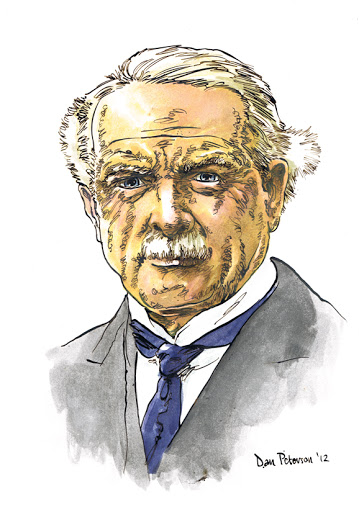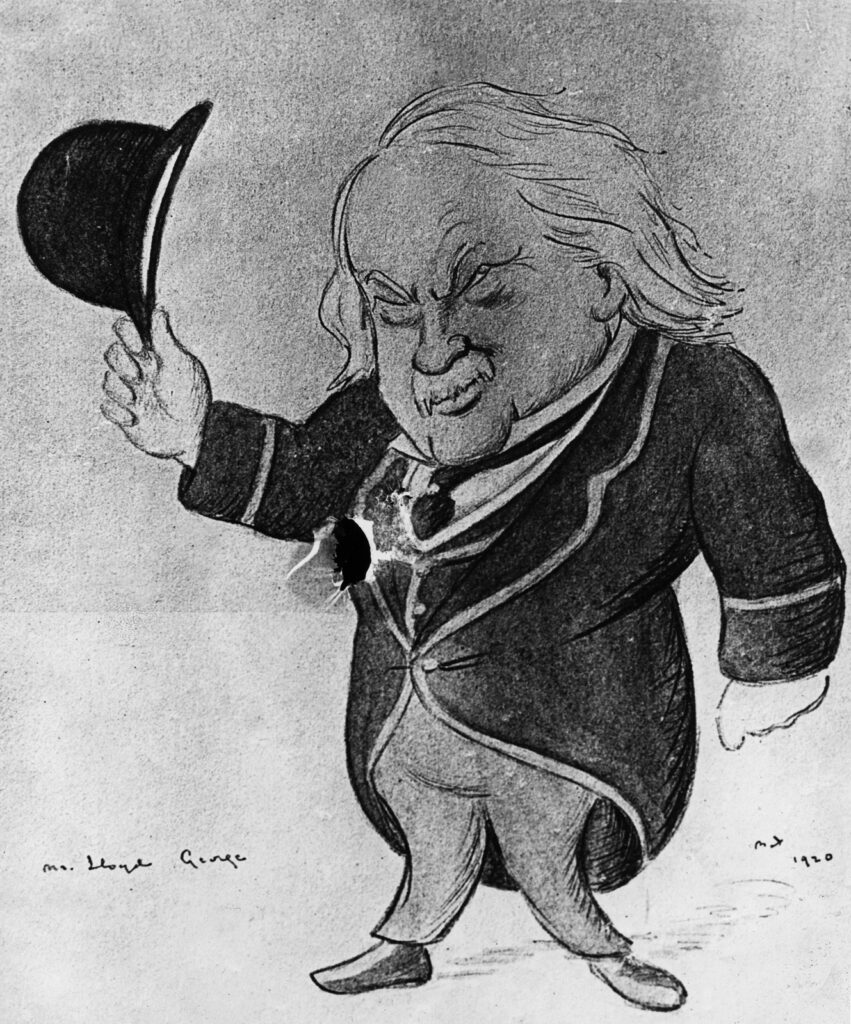David Lloyd George
DAVID LLOYD GEORGE was a British statesman, one of the 20th Century’s most famous radicals. He was the first and only Welshman to hold the office of Prime Minister of the United Kingdom, a post he held from 1916 to 1922.
Lloyd George, although born in Manchester, on January 17, 1863, grew up in Caernarvonshire under the care of his uncle, who was a cobbler. Partly self-taught, he excelled in his studies at the village school, learning Latin and French in order to qualify for legal training.
He is remembered as a man of great energy and an unconventional outlook in character and politics. In 1890, he was elected Liberal MP for Caernarvon, aged 27, a seat he would hold for 55 years. His scathing wit made him a dreaded – but respected – debating opponent in the House.
In 1906, he was made President of the Board of Trade and became recognised as a very able politician. Herbert Henry Asquith later promoted him to Chancellor and he became one of the great reforming chancellors of the 20th Century, introducing state pensions for the first time and declaring a war on poverty.
To pay for wide-ranging social reforms, as well as naval expansion, he intended, controversially, to tax land. He responded to the resulting outcry with passionate condemnation of landowners and aristocrats.
His reforming budget only passed after the 1911 Parliament Act greatly weakened the power of the House of Lords to block legislation from the Commons.
During the First World War, he threw himself into the job of Minister for Munitions, organising and inspiring the war effort.

Lloyd George accepted an invitation to form a government in December 1916. His dynamism made sure he was regarded as the right man to give Britain’s war a much needed boost, yet despite his success at centralising the government machine, the army remained beyond the reach of his reforming efforts.
With the end of the war in 1918 on Armistice Day he declared: “This is no time for words. Our hearts are too full of gratitude to which no tongue can give adequate expression.”
He was acclaimed as the man who had won the War and in 1918 the coalition won a huge majority. It was the first election in which any women were allowed to vote.
In 1919, he signed the Treaty of Versailles, which established the League of Nations and the war reparations settlement. The treaty was well received in Britain, and in August 1919 the king conferred on Lloyd George the Order of Merit.
He was troubled by domestic problems, though. His agreement to the independence of the South of Ireland was reluctant, and he presided over a period of depression, unemployment and strikes. There were also concerns that he was eager for war in Turkey, and serious allegations that he had sold honours. As a result of the many scandals he had attracted his popularity faded.
When the Conservatives broke up the coalition, he handed in his resignation.
Lloyd George remained a very controversial figure; his own party could not decide whether to support him or abandon him. He largely disregarded the problems facing the party, preferring to work for himself. As a result, one of the greatest Liberal leaders was also largely responsible for the party’s downfall.
The Liberal party never ran the government again. Lloyd George later sped up the fall of Neville Chamberlain by attacking his wartime failure in Norway in 1940.
In the meantime, he had spent the 1930s with journalism and travel, and the writing of his War Memoirs (1933–36) and The Truth About the Peace Treaties (1938). In 1940, Winston Churchill invited him to join his War Cabinet, but Lloyd George declined, ostensibly on grounds of age and health.
In 1944, he was created Earl Lloyd-George of Dwyfor, and died the following year, on
March 26, 1945, at Ty Newydd, Llanystumdwy, Caernarvonshire, aged 82. He is buried on the banks of the River Dwyfor.

Baron Blake, author of The Conservative Party from Peel to Thatcher, gave this insight into Lloyd George’s political impact:
“Lloyd George possessed eloquence; extraordinary charm and persuasiveness; a capacity to see the heart of problems whose complexity baffled lesser men; a profound sympathy with oppressed classes and races; and a genuine hatred of those who abused power, whether based on wealth or caste or military might.
“But there was an obverse side to these virtues: his love of devious methods; his carelessness over appointments and honours; and a streak of ruthlessness that left little room for the cultivation of personal friendship.
“Lloyd George, for all his greatness, aroused in many persons a profound sense of mistrust, and it was in the upper-middle class, represented in politics by Stanley Baldwin and Neville Chamberlain, that he inspired the most acute misgivings.
“They were both determined to exclude him from office, and it would be wrong to ascribe his long years in the political wilderness solely to the declining fortunes of the Liberal Party. Lloyd George was thus never able to recover the position he had lost in 1922.
“It was one of the tragedies of the inter-War years that, in an era not notable for political talent, the one man of genius in politics should have had to remain an impotent spectator. But his earlier achievements make his place in history secure: he laid the foundations of the welfare state and led Britain to victory in World War I.”
Sources include gov.uk and Britannica
BACK TO HOME PAGE